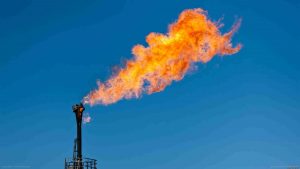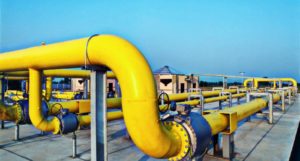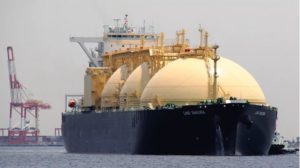
Turkmenistan is ready to export natural gas to European countries, said Gurbanguly Berdimuhamedov, former head of the country and current chairman of the People’s Council. He emphasized the strategic importance of cooperation with Europe in the field of energy resources, noting that the European market is one of the largest in the world.
Berdimuhamedov drew attention to the fact that Turkmenistan ranks fourth in the world ranking in terms of natural gas reserves. “I will give another concrete example: the Galkynyş field ranks first in the world in terms of gas reserves. Its reserves amount to 27.4 trillion cubic meters. These figures show that our country’s export potential allows us to meet the energy needs not only of our own, but also of our partners in the region and beyond,” the politician said.

U.S. President Donald Trump said in an interview aboard Air Force One that he wants to strike a $500 million deal with Ukrainian President Volodymyr Zelensky on access to rare earth minerals and natural gas in Ukraine in exchange for security guarantees in any potential peace settlement, The New York Post reported Saturday.
According to the publication, also present on the plane was national security adviser Mike Waltz, addressing whom Trump said: “Let’s keep these meetings going. They want to meet. People are being killed every day. Young beautiful soldiers are being killed. Young men like my sons. On both sides. All over the battlefield.”
It is noted that Vice President Vance will meet with Ukrainian President Volodymyr Zelensky at the Munich Security Conference next week.
Trump said he spoke on the phone with Vladimir Putin in an attempt to negotiate an end to the war in Ukraine.
“I’d rather not talk,” Trump said when asked how many times the two leaders had spoken. But he believes Putin “cares” about killing on the battlefield.

Ukrgazvydobuvannya (UGV) has launched two more high-yield wells with a flow rate of 270,000 cubic meters and 120,000 cubic meters of gas per day, the press service of Naftogaz Group said Tuesday. According to it, the wells are 6,200 meters and 6,225 meters deep, drilled in the same field, in the same reservoir and almost simultaneously, so they are called “twins” in technical slang.
Thanks to the use of modern drilling machines, the skill of Ukrburgaz specialists and the reduction of accidents during the work, the wells were drilled in 8 months, whereas previously it took 2-3 years.
“New seismic and drilling data allowed our specialists to create a high-quality 3D model, which is one of the best in “Ukrgasvydobuvannya” and allows us to effectively plan the directions of further development of this field. The works on the field continue, and drilling of the next appraisal and production well will be completed soon”, – Oleg Tolmachev, Head of UGV, noted.
In total, since the beginning of 2024, UGV has already put into operation seven new high-yield wells, including twin wells.
As reported, UGV launched 86 new wells during 2023, of which 24 – with an initial flow rate of more than 100 thousand cubic meters.
In 2022, UGV produced 12.5 billion cubic meters of natural gas (marketable), which is 3% less than in 2021. At the end of 2023, the company’s marketable gas production amounted to 13.224 billion cubic meters, which is 0.679 billion cubic meters more than in 2022. The target for 2024 is 13.75 billion cubic meters.
Naftohaz Ukrainy owns 100% of Ukrhazvydobuvannya.

The volume of natural gas stored by foreign companies in Ukrainian underground gas storage facilities (UGS) in the “customs warehouse” mode as of mid-June is 2.8 billion cubic meters (bcm), which is three times more than the same figure of the previous year, the press service of Ukrtransgaz said on Facebook.
Some 54 companies are currently using Ukrainian capacities, while a year earlier their number was seven.
Earlier, the company informed that as of June 1, non-residents stored 2 billion cubic meters in the “customs warehouse” mode, which is four times more than in the same period in 2019.
As reported, according to the estimates of head of Gas Transmission System Operator of Ukraine (GTSOU) Serhiy Makogon, the capacity of Ukrainian underground storage facilities that may be available to European companies at the end of the third quarter of this year will amount to about 10 billion cubic meters

Ukraine would receive income of $15 billion in five years of transit of Russian natural gas, according to Minister of Energy and Environment Protection of Ukraine Oleksiy Orzhel. “The approximate income with which Ukraine left this meeting [the meeting in Minsk on December 20, following which Ukraine-Russia-EC signed an intergovernmental protocol], is more than $3 billion for arbitration and approximately $3 billion for transit each year during five years,” the minister wrote in his column for the Ekonomichna Pravda (Economic Truth) publication on Tuesday.
“Thus, in five-year outlook, we will receive about $18 billion, of which $3 billion is ‘natural’ money – before the New Year. And this is without any enslaving conditions regarding the purchase of Russian gas,” Orzhel said.
At the same time, he said that at the meeting in Minsk the parties made significant progress, however, at present, the risk of not signing the new contract still exists.
“The protocol is not an agreement yet. In the last week of December, our companies will draft the text. But until the agreement itself has been signed, there is no transit. Can the other side change its mind at the last moment? Yes. Are we ready for this? Yes. But if this happens, Gazprom will suffer all image losses,” the minister added.

Ukraine in January-June 2019 imported 4.863 billion cubic meters of natural gas for a total of $1.060 billion, in particular in June 1.372 billion cubic meters for $259.638 million, according to the State Statistics Service.
Thus, the average price of gas imported by the country in June 2019 amounted to $189.3 per 1,000 cubic meters, which is 7.8% less than in May 2019 ($205.3).
The counterparties for the six months of 2019 were companies from Switzerland with 1.732 billion cubic meters of gas for $372.82 million, Germany with 1.567 billion cubic meters for $329.671 million, Hungary with 356.061 million cubic meters for $72.895 million, the Czech Republic with 246.071 million cubic meters for $51.799 million, Poland with 292.817 million cubic meters for $63.78 million, Austria with 224.315 million cubic meters for $63.597 million, France with 172.724 million cubic meters for $38.518 million, the UK with 106.64 million cubic meters for $28.751 million, Luxembourg with 88.627 million cubic meters for $23.159 million, Slovakia with 57.583 million cubic meters for $11.23 million, Italy with 16.893 million cubic meters for $3.487 million, and Bulgaria with 1.4 million cubic meters for $255,000.
Gas was not imported from Russia for the indicated period.